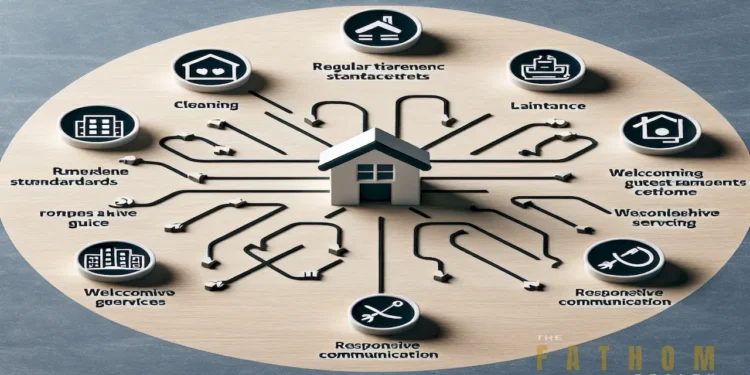Short-term rental property management sets the stage for this enthralling narrative, offering readers a glimpse into a story that is rich in detail and brimming with originality from the outset. From defining the concept to exploring key responsibilities, this guide delves deep into the world of managing short-term rental properties.
As we navigate through property listings, guest communication, pricing strategies, maintenance practices, legal compliance, and more, you'll gain valuable insights that can elevate your property management game to new heights.
Overview of Short-term Rental Property Management
Short-term rental property management involves the management of properties that are rented out on a short-term basis, typically for periods ranging from a few days to a few months.
There are several benefits to engaging in short-term rental property management. One of the main advantages is the potential for higher rental income compared to traditional long-term rentals. Short-term rentals often command higher nightly rates, allowing property owners to maximize their earnings.
Key responsibilities involved in managing short-term rental properties include:
Property Maintenance and Cleaning
- Ensuring the property is well-maintained and in good condition for guests.
- Coordinating regular cleaning services to keep the property clean and presentable.
Guest Communication and Support
- Responding to inquiries and booking requests promptly.
- Providing assistance to guests during their stay and addressing any issues that may arise.
Marketing and Pricing
- Creating attractive listings on rental platforms to attract guests.
- Setting competitive pricing based on market trends and demand.
Property Listings and Marketing
When it comes to managing short-term rental properties, creating appealing property listings and effectively marketing them are crucial for attracting guests and maximizing bookings. In this section, we will explore strategies for creating attractive property listings, compare different platforms for listing short-term rental properties, and share tips for optimizing property listings to increase guest interest.
Effective Strategies for Creating Appealing Property Listings
Creating an appealing property listing is essential to catch the eye of potential guests and entice them to book your rental. Here are some effective strategies to make your property listing stand out:
- High-Quality Photos: Ensure that you include high-quality photos of your property that showcase its best features. Professional photos can significantly improve the appeal of your listing.
- Detailed Descriptions: Provide a detailed description of your property, highlighting its unique selling points and amenities. Be sure to accurately represent the property to manage guest expectations.
- Clear Pricing and Availability: Clearly display your pricing and availability on the listing to make it easy for guests to book. Transparent pricing can help guests make informed decisions.
- Positive Reviews: Encourage guests to leave positive reviews after their stay to build credibility and trust with potential guests. Positive reviews can increase the likelihood of bookings.
Comparison of Different Platforms for Listing Short-Term Rental Properties
There are several platforms available for listing short-term rental properties, each with its own features and target audience. Here is a comparison of some popular platforms:
| Platform |
Features |
Target Audience |
| Airbnb |
Wide reach, user-friendly interface, secure payment system |
Diverse traveler demographic |
| Booking.com |
Global presence, flexible booking options, competitive pricing |
International travelers |
| VRBO |
Family-friendly options, direct communication with guests, subscription-based model |
Families and group travelers |
Tips for Optimizing Property Listings to Attract More Guests
To attract more guests to your short-term rental property, consider implementing the following tips to optimize your property listings:
- Use Techniques: Incorporate relevant s and phrases in your property title and description to improve visibility in search results.
- Update Calendar Regularly: Keep your availability calendar up-to-date to avoid double bookings and provide accurate information to potential guests.
- Promote Special Offers: Offer discounts or special promotions to attract more guests during off-peak seasons or to fill last-minute vacancies.
- Engage with Guests: Respond promptly to guest inquiries and reviews to show that you are attentive and caring towards your guests' needs.
Guest Communication and Experience
Clear and effective communication with guests is essential for providing a positive experience during their stay at your short-term rental property. By maintaining open lines of communication, you can address any concerns or questions promptly, leading to increased guest satisfaction.
Importance of Clear Communication
Effective communication with guests can set the tone for their entire experience at your rental property. From the initial booking process to check-out, clear communication ensures that guests feel informed and supported throughout their stay. It also helps to manage expectations and prevent any misunderstandings that could lead to negative reviews.
- Provide detailed check-in instructions and house rules in advance to avoid confusion.
- Respond promptly to guest inquiries and address any issues in a timely manner.
- Use a guest communication platform to streamline messages and keep track of guest interactions.
Enhancing the Guest Experience
Creating a memorable experience for guests goes beyond just providing a place to stay. By adding personal touches and amenities, you can exceed guest expectations and encourage positive reviews and repeat bookings.
- Welcome guests with a small gift or handwritten note to show appreciation for their stay.
- Offer local recommendations for dining, sightseeing, and activities to enhance their stay.
- Regularly update the property with fresh linens, toiletries, and other essentials to ensure guest comfort.
Handling Guest Inquiries and Feedback
Guest inquiries and feedback are valuable opportunities to improve your rental property and guest experience. By actively listening to guests and addressing their concerns, you can demonstrate your commitment to providing exceptional service.
- Respond to guest inquiries promptly and professionally, even if the answer is not what they were hoping for.
- Solicit feedback from guests after their stay through surveys or reviews to gain insights for future improvements.
- Address any negative feedback or issues raised by guests with empathy and a willingness to resolve the situation.
Pricing and Revenue Management
Setting the right pricing for short-term rentals is crucial for attracting guests and maximizing profits
. Revenue management plays a key role in ensuring that the property is priced competitively while also taking advantage of demand fluctuations and seasonality.
Setting Competitive Pricing
Setting competitive pricing involves analyzing market trends, competitor rates, and demand in the area. It's important to strike a balance between being attractive to potential guests and ensuring profitability for the property owner.
- Monitor competitor rates regularly to stay competitive.
- Consider factors like location, amenities, and property size when setting prices.
- Use dynamic pricing strategies to adjust rates based on demand and availability.
Importance of Revenue Management
Revenue management is essential for maximizing profits and optimizing occupancy rates.
Effective revenue management involves pricing strategies, forecasting demand, and adjusting rates accordingly to maximize revenue.
- Implement yield management techniques to capitalize on high-demand periods.
- Analyze booking patterns and historical data to predict future demand.
- Optimize pricing based on seasonality and events in the area.
Tips for Adjusting Pricing
Adjusting pricing based on demand and seasonality can help increase bookings and revenue.
- Offer discounts for last-minute bookings to fill gaps in the calendar.
- Implement weekend or weekday pricing to attract different types of guests.
- Create special promotions during off-peak seasons to stimulate demand.
Property Maintenance and Housekeeping
Maintaining a short-term rental property is crucial for ensuring a positive guest experience and maximizing revenue. Housekeeping plays a significant role in guest satisfaction, as cleanliness and well-maintained properties are key factors in customer reviews and return bookings. Efficient property maintenance strategies are essential to keep the property in top condition while minimizing costs.
Best Practices for Maintaining Short-term Rental Properties
- Regular inspections to identify and address any maintenance issues promptly.
- Schedule routine cleaning and maintenance tasks to prevent wear and tear.
- Invest in high-quality furnishings and appliances that are durable and easy to clean.
- Establish relationships with reliable maintenance and repair professionals for quick assistance.
- Create a maintenance calendar to track tasks and ensure nothing is overlooked.
Importance of Housekeeping in Guest Satisfaction
Housekeeping directly impacts the guest's perception of the property and their overall experience. A clean and well-maintained property not only meets guests' expectations but also exceeds them, leading to positive reviews and recommendations.
Strategies for Managing Property Maintenance Efficiently
- Implement a preventative maintenance program to address issues before they become major problems.
- Train housekeeping staff on proper cleaning techniques and standards to maintain consistency.
- Utilize technology such as property management software to streamline maintenance requests and tracking.
- Encourage open communication between guests and management to report any maintenance issues promptly.
- Maintain a budget for regular maintenance and repairs to avoid unexpected expenses.
Legal Compliance and Regulations
When it comes to short-term rental property management, understanding and adhering to legal compliance and regulations is crucial to avoid any potential issues. Here we will discuss some key considerations and tips for ensuring compliance.
Key Legal Considerations
It is important for property managers to be aware of key legal considerations to operate within the bounds of the law:
- Understanding local zoning laws and regulations regarding short-term rentals.
- Compliance with building and safety codes to ensure the property meets all necessary requirements.
- Ensuring proper insurance coverage for short-term rentals to protect against liability issues.
Common Regulations to Adhere to
Property managers must adhere to common regulations to operate legally and ethically:
- Registration requirements with local authorities for short-term rentals.
- Occupancy tax collection and remittance to the appropriate authorities.
- Noise ordinances and other neighborhood regulations to maintain a peaceful environment.
Tips for Ensuring Compliance
Here are some tips to help property managers ensure compliance with local laws and regulations:
- Stay informed about any changes or updates to regulations that may impact short-term rentals.
- Consult with legal professionals or experts in real estate law to ensure full compliance.
- Keep detailed records of all transactions and communications related to the rental property for documentation purposes.
Ultimate Conclusion
In conclusion, Short-Term Rental Property Management is a multifaceted endeavor that requires a blend of strategy, communication, and attention to detail. By implementing the tips and best practices Artikeld in this guide, you can enhance the guest experience, maximize profits, and ensure legal compliance in your property management journey.
Clarifying Questions
How can I optimize my property listings for maximum guest attraction?
To optimize your property listings, focus on high-quality photos, detailed descriptions, competitive pricing, and highlighting unique selling points of your rental.
What are the key responsibilities involved in managing short-term rental properties?
Key responsibilities include property maintenance, guest communication, pricing strategy, housekeeping coordination, and ensuring legal compliance.
How can I effectively handle guest inquiries and feedback?
Respond promptly to inquiries, provide helpful and clear information, address feedback constructively, and use feedback to enhance the guest experience.
What are some common legal considerations for short-term rental property management?
Legal considerations include zoning regulations, tax compliance, rental agreements, safety standards, and local licensing requirements.
Why is revenue management important in maximizing profits for short-term rentals?
Effective revenue management ensures that your rental property is priced competitively, leading to higher occupancy rates and increased profitability.













